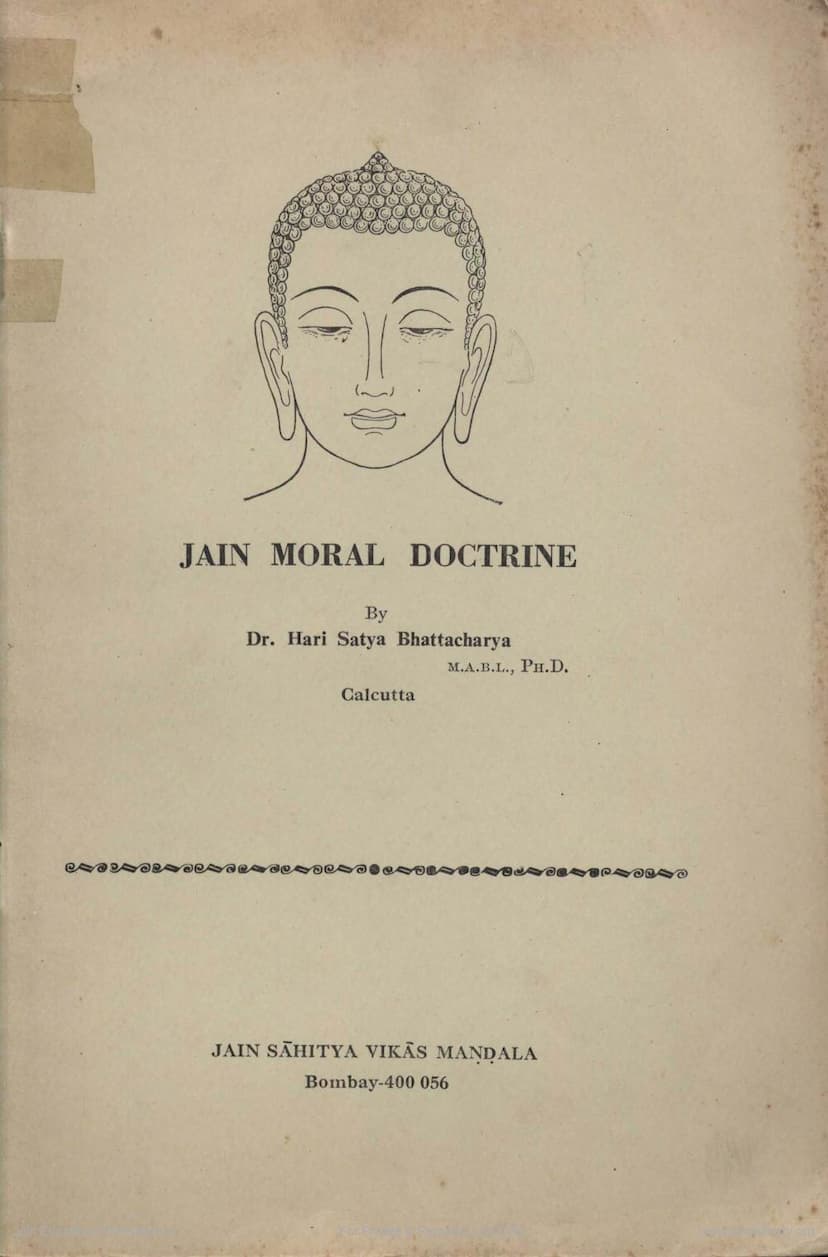Jain Moral Doctrine
Added to library: September 2, 2025

Summary
This document is a comprehensive overview of the Jain moral doctrine as presented in the book "Jain Moral Doctrine" by Dr. Hari Satya Bhattacharya. Published by Jain Sahitya Vikas Mandal in 1976, the book explores the fundamental principles of Jainism's ethical system, aiming to connect religion and morality and offer a basis for a universal ethical framework.
The book is structured into seven chapters:
1. Basic Principles of Religion and Morality: This chapter begins by exploring the subjective nature of religion and the universal concept of God as possessing infinite power, apprehension, knowledge, and joy. It argues that this fundamental God-idea, when rationalized, points not to an external transcendent being but to the essential nature of every living being. The chapter then delves into the concept of morality, highlighting the innate moral sense in humans and exploring various philosophical theories on the basis of moral value, including hedonism, utilitarianism, and intuitionism. It concludes that moral value stems from human nature, specifically its essential, perfectible aspect, and posits that religion and morality are intrinsically linked, both aiming at self-realization.
2. The Indispensable Associates of Çāritra (Right Conduct): This chapter focuses on the Jain concept of achieving self-realization and perfection through Çāritra (right conduct). It explains that the soul's imperfections are due to Karma, a material substance that adheres to it. The goal is to emancipate the soul by shedding this Karma. The book introduces Samyak-darśana (right faith) and Samyak-jñāna (right knowledge) as crucial prerequisites for Samyak-cāritra. Right faith is described as an immediate apprehension of seven realities, while right knowledge involves understanding the self and the non-self through specific analytical categories and perspectives. The chapter details various types of faith and knowledge and their cultivation within Jainism.
3. Operative Factors in Immorality: This chapter examines the causes of immorality and the bondage of the soul to Karma. It explains Asrava (inflow of Karma) as the primary cause, stemming from Yoga (activity of mind, body, and speech) and exacerbated by Kaşāya (passions like anger, greed, deceit, and pride). The chapter details the numerous types of Asrava and how they lead to Bandha (bondage). It also identifies subjective states like wrong belief (Mithya-darśana), non-restraint (Avirati), carelessness (Pramāda), and passions (Kaşāya) as weakening the soul and making it susceptible to Karma. The chapter emphasizes that even subha (auspicious) Karmas must eventually be relinquished for ultimate liberation.
4. Opposition to Immorality: This chapter outlines the Jain approach to overcoming immorality and achieving liberation. It introduces Samvara (stoppage of further Karma inflow) and Nirjarā (elimination of accumulated Karma) as the means to this end. Samvara is achieved through practices like Gupti (suppression of yoga), Samiti (carefulness), Dharma (ten virtues), Anuprekşā (meditations), Parişaha-jaya (conquest of hardships), and Çaritra (right conduct). Nirjarā is facilitated by Tapa (ascetic austerities), both external and internal, such as fasting, eating less, renunciation of taste, living in solitude, penances, expiation, reverence, service, study, avoidance, and contemplation. The ultimate goal is the complete eradication of Karma for Mokşa (liberation).
5. Cardinal Virtues: This chapter provides a detailed exposition of the five cardinal virtues, or Vratas, in Jainism: Ahimsā (non-violence), Satya (truthfulness), Asteya (non-stealing), Brahmacarya (celibacy/sexual purity), and Aparigraha (non-attachment). It explains that these Vratas are central to Jain morality and that their observance, in perfect or limited forms (Mahāvrata and Anuvrata respectively), leads to the reduction of Karma. The chapter also discusses the Śilas (sub-vows) that complement the Vratas for householders and the concept of Sallekhanā (contemplative death) as a peaceful and dispassionate departure from the physical body. The interconnectedness of the Vratas is highlighted, with Ahimsā being considered the fundamental virtue that encompasses the others.
6. Stages in the Moral Progress: This chapter outlines the fourteen Guņasthānas (stages of spiritual progress) in Jainism. These stages represent the gradual subsidence of the eight types of Karma and the evolution of right faith, knowledge, and conduct. The stages progress from initial wrong belief (Mithyātva) through various levels of mixed beliefs, partial restraint, perfect conduct, and ultimately to the state of omniscience and liberation (Sayoga-kevali and Ayoga-kevali). The chapter details how the removal of Mohaniya (deluding Karma) is central to this progress, with the stages representing different degrees of its mitigation or annihilation. It also distinguishes between householders (Agāris) and homeless saints (Anagāris) based on their adherence to these stages and the associated practices (Pratimās).
7. The Jaina Çāritra as the Basis of an Universal Religion and Morality: The final chapter synthesizes the preceding discussions. It argues that Jainism's unique contribution lies in its ideal of self-realization and its understanding of morality as inherent to human nature, rather than an external command. It posits that all acts are ultimately "self-pointing," leading to the perfection of the soul. The chapter emphasizes that the five Vratas, particularly Ahimsā, form the core of this ethical system. It further suggests that the internal purity of intention (avoidance of Pramatta-yoga) is as crucial as outward conduct. The chapter concludes by proposing that the Jain emphasis on the essential nature of the self as the source of moral action, coupled with the practice of the Vratas, provides a robust foundation for a universal religion and ethics, a path to true peace and self-realization.
In essence, "Jain Moral Doctrine" by Dr. Hari Satya Bhattacharya presents a detailed and systematic exposition of the Jain ethical framework, emphasizing the interconnectedness of religion and morality, the role of Karma, the importance of right faith, knowledge, and conduct, and the ultimate goal of soul liberation through self-perfection. The book highlights the Jaina path as a rational and self-pointing approach to achieving universal well-being and spiritual enlightenment.